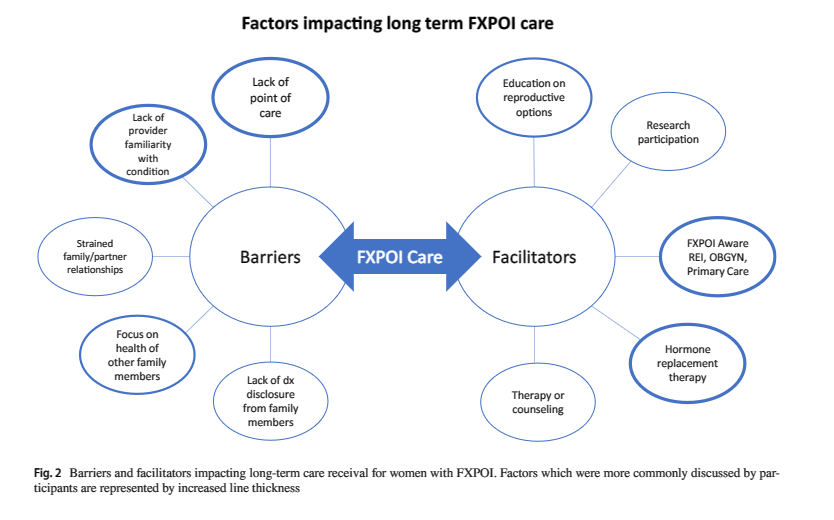Summarized by Emily Allen and Bonnie Poteet
Bonnie was a 2021 NFXF Summer Scholar! This work was part of her summer project. You can find a 15-minute recording about her project here.
Summary (background, methods, results):
The majority of women learn they are premutation carriers due to a family history of Fragile X syndrome (FXS), but an estimated 15% of women are diagnosed due to symptoms of Fragile X-associated Primary Ovarian Insufficiency (FXPOI). Approximately 20-30% of women with the Fragile X premutation are at risk for FXPOI, defined as having absent or irregular menstrual cycles before the age of 40. Women with the Fragile X Premutation or POI symptoms should receive reproductive counseling at childbearing age, including a fertility workup, hormone panel, genetic counseling, and education on reproductive options including natural conception, assisted reproductive technologies, and adoption.
In this study, we conducted qualitative interviews with 24 women with FXPOI exploring how FMR1 screening, physician education, and supportive care impacted their experience receiving a diagnosis. Three subgroups were compared: women diagnosed through a family history of FXS who have biological children, women diagnosed through a family history of FXS who do not have biological children, and women diagnosed through symptoms of POI.
We identified common themes among many of the interviews that included hopes for broader clinician awareness of FXPOI, clearer guidelines for clinical treatment, and proper fertility workups to expand reproductive options prior to POI onset. Participants also spoke of difficulty finding centralized sources of care. Overall, our results indicate a lack of optimal care of women with a premutation particularly with respect to FMR1 screening for molecular diagnosis, short and long-term centralized treatment, and clinical and emotional support. The creation of a “FXPOI health navigator” could serve as a centralized resource for the premutation patient population, assisting in connection to optimal treatment and appropriate referrals, including genetic counseling, mental health resources, advocacy organizations, and better-informed physicians.
Why this matters:
This unique qualitative research provides firsthand perspectives from women with FXPOI regarding their overall experience of diagnosis and follow-up care. Their experiences reveal a need for necessary surveillance, centralized care, and treatment of women with FXPOI. The present study suggests women with POI are inadequately served by healthcare providers not offering FMR1 screening pre-diagnosis or comprehensive guidance to appropriately navigate care after their diagnosis. Due to the comprehensive information essential for FXPOI care navigation, it is critical that any healthcare provider ordering genetic testing understands the implications of receiving a premutation diagnosis. While genetic counselors are a valuable component in serving these families from pre-counseling, diagnosis, to post-counseling, optimal care for women at risk for FXPOI occurs when genetic counselors and OB/GYNs work together
Next steps:
Future directions for this research include the development of FXPOI materials including a clinical care sheet for women with FXPOI and development of an educational guide for healthcare providers to increase clinician knowledge. We are currently conducting two additional studies to follow up on these findings. First, we are conducting surveys in healthcare providers to better understand the gaps in knowledge that exist related to FXPOI. Second, we are conducting similar qualitative interviews in women from minority populations to identify any healthcare disparities in these patient population. Information from all of these studies may be used and referenced when developing future FXS or premutation screening or care guidelines. The current research provides evidence for the creation of a FXPOI navigator, an experienced healthcare provider or patient advocate specializing in support and coordination of FXPOI-related care. This service could potentially be provided online to ensure equitable access for patients.
Acknowledgements:
The authors would like to thank all women who participated and shared their experiences for this research study. This study received funding from the National Fragile X Foundation, the Georgia Association of Genetic Counselors, and the NICHD and the National Institute of Neurological Disorders and Stroke (NINDS) that supports our National Fragile X Center (U54NS091859 and P50HD104463) in which this work was conducted. This study also utilized a REDCap database supported by Emory’s Library and Information Technology Services (UL1TR000424).
about

Hilary Rosselot
Hilary joined the NFXF team in 2019. Prior to joining the NFXF team, she worked at the Cincinnati Fragile X Research and Treatment Center for over five years. She has experience as a clinical research coordinator across many types of clinical trials and served as the clinical research manager for the Cincinnati program. She earned a bachelor’s degree in psychology, a master’s, and is a SOCRA certified clinical research professional (CCRP). She enjoys time with family and friends, a great book, a strong cup of coffee and, of course, a good laugh!
FOR MORE DETAILS VISIT:
Read the full publication, The diagnostic experience of women with fragile X–associated primary ovarian insufficiency (FXPOI), in the Journal of Assisted Reproduction and Genetics.
MORE RESEARCH RESULTS
The diagnostic experience of women with fragile X–associated primary ovarian insufficiency (FXPOI)
Researchers at Emory University conducted qualitative interviews with 24 women with FXPOI exploring how FMR1 screening, physician education, and supportive care impacted their experience receiving a diagnosis. Their results are in!
Why is the RECONNECT trial with ZYN002 Being Conducted in Fragile X Syndrome?
Zynerba Pharmaceuticals shares why the RECONNECT trial with ZYN002 is being conducted in Fragile X syndrome



